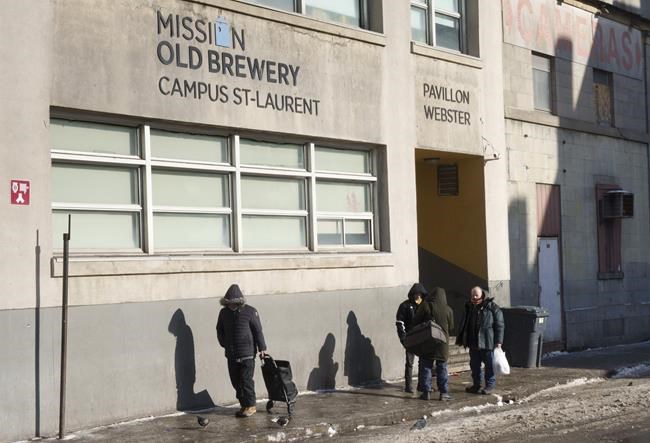Homeless shelters face added strain amid Omicron, high rates of people on streets
Advertisement
Read this article for free:
or
Already have an account? Log in here »
To continue reading, please subscribe:
Monthly Digital Subscription
$0 for the first 4 weeks*
- Enjoy unlimited reading on winnipegfreepress.com
- Read the E-Edition, our digital replica newspaper
- Access News Break, our award-winning app
- Play interactive puzzles
*No charge for 4 weeks then price increases to the regular rate of $19.00 plus GST every four weeks. Offer available to new and qualified returning subscribers only. Cancel any time.
Monthly Digital Subscription
$4.75/week*
- Enjoy unlimited reading on winnipegfreepress.com
- Read the E-Edition, our digital replica newspaper
- Access News Break, our award-winning app
- Play interactive puzzles
*Billed as $19 plus GST every four weeks. Cancel any time.
To continue reading, please subscribe:
Add Free Press access to your Brandon Sun subscription for only an additional
$1 for the first 4 weeks*
*Your next subscription payment will increase by $1.00 and you will be charged $16.99 plus GST for four weeks. After four weeks, your payment will increase to $23.99 plus GST every four weeks.
Read unlimited articles for free today:
or
Already have an account? Log in here »
Hey there, time traveller!
This article was published 18/01/2022 (1423 days ago), so information in it may no longer be current.
OTTAWA – Staff at shelters and homeless agencies are struggling to support people living on the streets as the highly transmissible Omicron COVID-19 variant sweeps through communities.
Deirdre Freiheit, president and CEO of Shepherds of Good Hope in Ottawa, said her organization is grappling with staff shortages, the shelters and isolation centre being at full capacity, and people staying in shelters longer due to a lack of affordable housing.
“It’s just a challenge all around,” she said.

Freiheit said her team has had to put people in staff positions they wouldn’t normally do, like turning managers and security guards into front-line workers, and administrative staff into recruiting specialists.
“We had to get really creative to try to get enough people in to work,” she said.
Freiheit said some of the challenges her staff is facing existed before the pandemic, including the toxic drug supply in the streets, but have been made much worse since COVID-19 struck Canada.
Warren Maddox, executive director of Fredericton Homeless Shelters in New Brunswick, says staff are also seeing more people dealing with addiction — largely to crystal meth — as well as more complex and acute mental health issues.
“We’re not fighting one pandemic. We’re fighting three. It’s just that COVID gets all the spotlight and money,” said Maddox.
Toronto’s shelter system is currently dealing with 416 COVID-19 cases and active outbreaks at 49 shelters, according to the city’s dashboard of pandemic data, which was last updated Monday.
Anna Pacik, fundraising and communications manager at The Lighthouse Supported Living in Saskatoon, said in an email she was unable to find someone to speak with The Canadian Press because her organization is so short-staffed and facing a growing outbreak in its shelters.
“We are exhausted right now,” said Pacik.
The Centre for Addiction and Mental Health and the Mental Health Commission of Canada released study results in July 2021 that showed 60 per cent of homelessness service providers have experienced moderate levels of burnout.
The Canadian Alliance to End Homelessness and health leaders released a statement on Friday calling on governments to support the growing number of people facing homelessness and the staff straining to meet the need.
Tim Richter, president of the alliance, says it is hearing that front-line shelters and homeless agencies across the country are “completely overwhelmed” due to staffing shortages and lack of funding to meet the demand for shelter.
A spokesperson for Health Minister Jean-Yves Duclos sent a statement Wednesday that said the federal government’s priority is to keep Canadians safe, especially those who are homeless or at risk of becoming homeless.
The spokesperson said the government has created vaccination strategies for the homeless population, set up voluntary isolation sites and committed an extra $1.5 billion in last year’s budget for the rapid housing initiative.
Shelters are spending a lot of money just trying to keep things going while staff are off to isolate, creating a “really dire and dangerous situation,” said Richter.
Maddox said the federal government could send funding directly to front-line organizations like his, which would allow them to hire a mental health counsellor and support staff.
That funding would help them deal with the backlog of cases in front of them now, he said. “We’re just trying to keep up with what we’ve got.”
Though her shelters are facing compounding challenges, Freiheit said she is still hopeful that things will get better.
“We’ve got exceptional people working to try to support those who are often cast aside. That’s what drives me, to see how people come together and how much support we are still able to give to people who may not get it otherwise.”
This report by The Canadian Press was first published Jan. 18, 2022.
———
This story was produced with the financial assistance of the Facebook and Canadian Press News Fellowship.
Note to readers: This is a corrected story. A previous version said Health Minister Jean-Yves Duclos’ office did not respond to a request for comment.




